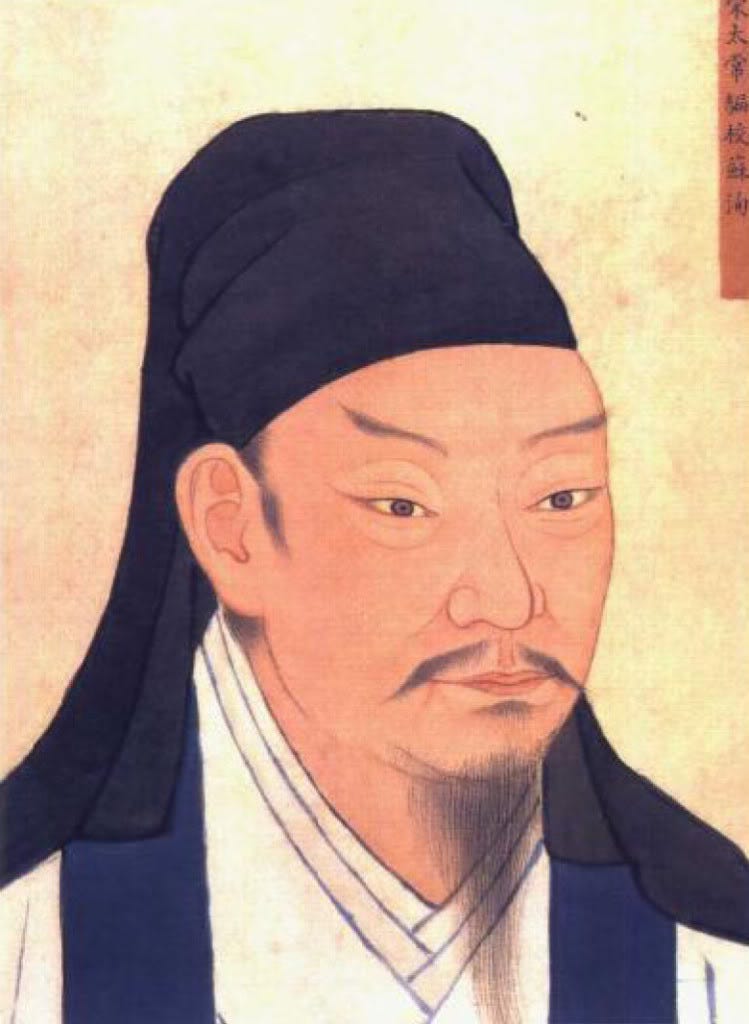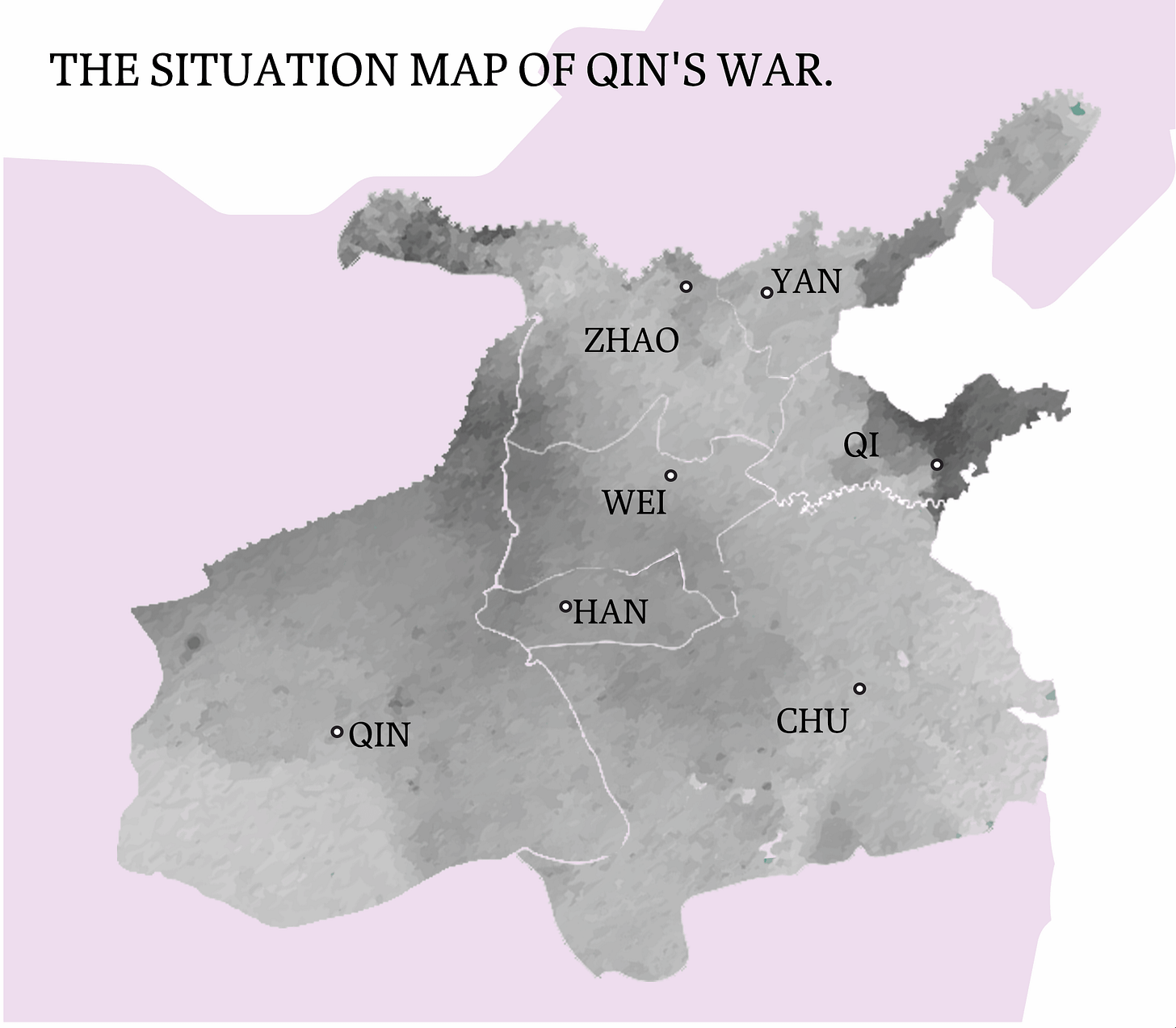The Cost of Peace: Ancient Lesson from The Six States
An Urgent Reminder of Timeless Wisdom in the Face of Today's Trade Wars and Geopolitical Standoffs
"True peace isn’t the absence of struggle – it’s the presence of integrity. It’s knowing when to bend and when not to break."
This article is written by Yanlong Huo. Huo, born and raised in Beijing and currently residing in the Netherlands, is a seasoned business development leader, bridging European and Chinese enterprises along with passionate interests in culture, history, and philosophy.
I still remember that one middle school history lesson. It was about Su Xun 苏洵, a Northern Song essayist, and his piece “On the Six States” (《六国论》).
It wasn’t just a dusty text - it was a mirror. A warning.
Su Xun 蘇洵 (1009–1066), born to an affluent family at Meishan, Sichuan Province, was a renowned scholar, essayist and philosopher during the Song Dynasty (960-1279), listed as one of the Eight Masters of the Tang and Song, along with his sons Su Shi and Su Zhe. Picture credit Wikidata Su Xun
Su Xun looked back in his essay at the Warring States period (475 - 221 BCE) more than 1000 years earlier, when six kingdoms, among others Han and Zhao were devoured one by one by the rising Qin.[1] They didn’t fall because their soldiers were weak or their strategies poor. Su Xun argued their real failure was appeasement: offering land and dignity to buy time, hoping Qin’s hunger would fade.
“Today five cities are ceded, tomorrow ten more; only then can one sleep peacefully for a night. But upon waking, the Qin army is upon us again. The lands of the feudal lords are limited, while the greed of violent Qin knows no bounds. The more they are appeased, the more urgently they invade.”
But here’s the deeper tragedy: even those who resisted Qin fell, not because they were weak, but because they stood alone. Without allies, even the brave were devoured. The lesson wasn’t only about appeasement. It was also about disunity.
To underscore this, history gives us two striking figures: Jing Ke荆轲 and Li Mu李牧.[2] Jing Ke, the assassin from the state of Yan, famously attempted to kill the King of Qin in a desperate act of self-sacrifice - a last, poetic gesture of defiance. Li Mu, a brilliant general of Zhao, held back Qin’s advances for years through military acumen and unwavering discipline. Yet both ultimately failed - not due to personal flaw, but because they were isolated. Valor without unity is tragedy foretold.
Picture credit : Wikimedia commons
Su Xun wrote “On the Six States” not in an ivory tower, but in a moment of urgent national reflection.[3] The Northern Song dynasty, under constant pressure from the Khitan Liao and Western Xia, was following a similar path - endless tributes of silver and silk in exchange for short-term peace. Though land was not ceded, the dynamic was the same: submission disguised as diplomacy. Su saw history repeating. His words weren’t just a commentary on ancient statecraft, but a plea to his own leaders:
“To serve Qin with land is like dousing a fire with kindling. Until the wood runs out, the flames will not stop.”
That metaphor still burns. Feeding the tiger does not tame it. It teaches it to expect more.
This logic plays out globally until present time. In today’s trade wars and geopolitical standoffs, the strategy of buying time through compromise has morphed into economic appeasement.[4] Powerful nations use tariffs and sanctions to fracture alliances and extract concessions - reminiscent of Qin’s “divide-and-conquer” diplomacy. Those who yield temporarily may find themselves permanently diminished.
Even in corporate boardrooms, we see the Six States in miniature: leaders relinquishing purpose for profit, startups trading vision for funding, employees sacrificing well-being to appease toxic environments. Appeasement is everywhere. So is fragmentation. And so is the cost.
True peace isn’t the absence of struggle. It’s the presence of integrity. It’s knowing when to bend and when not to break.
Su Xun’s timeless insight whispers through centuries, calling not only to states but to entrepreneurs, leaders, and individuals:
"Appeasement may hush the storm, but it arms the enemy for the next battle."
Think of Braveheart - that fierce cry for freedom. William Wallace refused to kneel, not because he thought he could win, but because there are some things you don’t trade, even at the cost of peace. His defiance, like Su Xun’s counsel, was not just about victory, but about where one draws the line.
The challenge is eventually always the same: to draw that line not in sand, but in stone. To know what you’ll negotiate, and what you’ll defend to the end.
Maybe peace begins not when we avoid the storm, but when we stop feeding it…
April 11, 2025
Yanlong Huo
[1] The Warring States period (475–221 BCE) was marked by relentless warfare among competing states. It ended when Qin unified China under centralized rule in 221 BCE.
[2] Jing Ke (d. 227 BCE) was a retainer of the Yan state who attempted to assassinate the King of Qin in a last-ditch resistance. Li Mu (d. 229 BCE) was a general of Zhao, famed for successfully defending against Qin but ultimately betrayed by his own court.
[3] During the 11th century, the Song dynasty signed treaties such as the Treaty of Chanyuan (1005) with the Khitan Liao, agreeing to annual tribute payments of silver and silk to preserve peace - a strategy Su Xun criticized in “On The Six States”.
[4] The global trade tensions of the 21st century, especially between the U.S. and China, echo ancient strategic dilemmas. Just as the six states failed to unify against Qin, today’s fractured alliances face similar risks of being undermined by dominant powers.
This article has also been translated in Dutch









